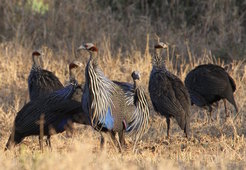Collective behaviours and social structure in animal populations

Abstract How do collective behaviours and social structure emerge in animal populations? Seemingly simple mechanisms can often be amplified to produce remarkable group-level behaviours or population-level patterns. For example, highly cohesive collective movement patterns can emerge when animals respond to the movement cues of nearby neighbours. Similarly, groups of animals can solve complex problems, such as sensing their environment or finding cryptic new food sources, by eavesdropping on information being generated by nearby individuals. While natural selection acts on the behavioural phenotypes of (often selfish) individuals, collective behaviours are a group-level, or sometimes population-level, property that themselves can shape selection, and therefore form part of a complex evolutionary process. To understand how collective behaviours evolve or social structure emerges, one must understand (1) the mapping between individual phenotypes and collective behaviour, (2) the link between collective behaviour, the environment (both social and physical), and individual fitness, and (3) how selection arising from ecological or social conditions drives the expression of the phenotypes that are linked with collective behaviour or particular decisions that lead to consistent social structure.
We are seeking one or more PhD students to join an exciting new group investigating the ecology and evolution of social and collective animal behaviour. The student(s) will have the opportunity to conduct pioneering studies on both new and well-established study systems, with a major focus on conducting observational and experimental studies in the wild. Our current projects include whole-group high-resolution GPS tracking, experimental manipulation of social networks, and simultaneous tracking of predators and prey. Our strength is to integrate technology and novel analytical techniques in studies of wild animal groups, with a particular focus on birds. Applicants are invited to contact Dr. Damien Farine to discuss potential project ideas or research topics to work on. We seek highly motivated students, particularly those with an empirical background, a broad interest in social behaviour, and who wish to work with animals in the wild. Quantitative skills are not a prerequisite for consideration, but positive attitude towards doing great science is!
Keywords self-organisation, collective animal behaviour, social networks, tracking, natural selection, multi-level selection, evolution, phenotypic traits, group composition, vocal communications
Main advisor Damien Farine, MPIO Radolfzell / University Konstanz
